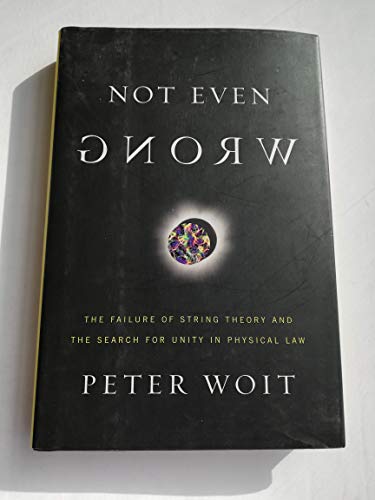
Synopsis
"synopsis" may belong to another edition of this title.
About the Author
Reviews
String theory is the only game in town in physics departments these days. But echoing Lee Smolin's forthcoming The Trouble with Physics (Reviews, July 24), Woit, a Ph.D. in theoretical physics and a lecturer in mathematics at Columbia, points out—again and again—that string theory, despite its two decades of dominance, is just a hunch aspiring to be a theory. It hasn't predicted anything, as theories are required to do, and its practitioners have become so desperate, says Woit, that they're willing to redefine what doing science means in order to justify their labors. The first half of Woit's book is a tightly argued, beautifully written account of the development of the standard model and includes a history of particle accelerators that will interest science buffs. When he gets into the history of string theory, however, his pace accelerates alarmingly, with highly sketchy chapters. Reading this in conjunction with Smolin's more comprehensive critique of string theory, readers will be able to make up their own minds about whether string theory lives up to the hype. (Sept.)
Copyright © Reed Business Information, a division of Reed Elsevier Inc. All rights reserved.
"About this title" may belong to another edition of this title.
Other Popular Editions of the Same Title
Search results for Not Even Wrong: The Failure of String Theory and the...
Not Even Wrong: The Failure of String Theory and the Search for Unity in Physical Law
Seller: Wonder Book, Frederick, MD, U.S.A.
Condition: Very Good. Very Good condition. Good dust jacket. A copy that may have a few cosmetic defects. May also contain light spine creasing or a few markings such as an owner's name, short gifter's inscription or light stamp. Seller Inventory # J12B-02930
Not Even Wrong: The Failure of String Theory and the Search for Unity in Physical Law
Seller: Wonder Book, Frederick, MD, U.S.A.
Condition: Good. Good condition. Good dust jacket. A copy that has been read but remains intact. May contain markings such as bookplates, stamps, limited notes and highlighting, or a few light stains. Seller Inventory # K03P-00381
Not Even Wrong : The Failure of String Theory and the Search for Unity in Physical Law
Seller: Better World Books, Mishawaka, IN, U.S.A.
Condition: Very Good. Former library book; may include library markings. Used book that is in excellent condition. May show signs of wear or have minor defects. Seller Inventory # 4061600-75
Not Even Wrong : The Failure of String Theory and the Search for Unity in Physical Law
Seller: Better World Books, Mishawaka, IN, U.S.A.
Condition: Good. Used book that is in clean, average condition without any missing pages. Seller Inventory # 6328617-6
Not Even Wrong : The Failure of String Theory and the Search for Unity in Physical Law
Seller: Better World Books, Mishawaka, IN, U.S.A.
Condition: Good. Former library book; may include library markings. Used book that is in clean, average condition without any missing pages. Seller Inventory # 4404820-75
Not Even Wrong : The Failure of String Theory and the Search for Unity in Physical Law
Seller: Better World Books, Mishawaka, IN, U.S.A.
Condition: Very Good. Used book that is in excellent condition. May show signs of wear or have minor defects. Seller Inventory # 2347114-6
Not Even Wrong: The Failure of String Theory and the Search for Unity in Physical Law
Seller: HPB-Diamond, Dallas, TX, U.S.A.
Hardcover. Condition: Very Good. Connecting readers with great books since 1972! Used books may not include companion materials, and may have some shelf wear or limited writing. We ship orders daily and Customer Service is our top priority! Seller Inventory # S_437370285
Not Even Wrong: The Failure of String Theory and the Search for Unity in Physical Law
Seller: HPB-Emerald, Dallas, TX, U.S.A.
Hardcover. Condition: Very Good. Connecting readers with great books since 1972! Used books may not include companion materials, and may have some shelf wear or limited writing. We ship orders daily and Customer Service is our top priority! Seller Inventory # S_440297197
Not Even Wrong: The Failure of String Theory and the Search for Unity in Physical Law
Seller: HPB Inc., Dallas, TX, U.S.A.
Hardcover. Condition: Very Good. Connecting readers with great books since 1972! Used books may not include companion materials, and may have some shelf wear or limited writing. We ship orders daily and Customer Service is our top priority! Seller Inventory # S_438837366
Not Even Wrong: The Failure of String Theory and the Search for Unity in Physical Law
Seller: Half Price Books Inc., Dallas, TX, U.S.A.
Hardcover. Condition: Very Good. Connecting readers with great books since 1972! Used books may not include companion materials, and may have some shelf wear or limited writing. We ship orders daily and Customer Service is our top priority! Seller Inventory # S_445551431

